Love Scam
An overview of love scams:
Love scammers pretend to be looking for love, engaging the affection of their potential victims by using photos from the internet to create an appealing image of themselves. They often target people on dating sites or in chat rooms and repeatedly claim to be in love early on, attempting to make the victim fall for them quickly. To combat love scams, certain websites go beyond mainstream approaches to report and take action against scammers. They share their experiences and information in the form of downloadable documents to help educate and warn others.
Love scams, or romance scams, involve fraudsters creating fake online identities to establish deceptive romantic relationships. Using stolen photos and fabricated details, scammers build emotional connections, often claiming to work abroad. They exploit victims both emotionally and financially, requesting money under false pretenses, such as emergencies or travel expenses. Avoiding in-person meetings, scammers use isolation tactics to prevent victims from seeking advice from others. Persistent communication, rapid emotional bonding, and financial requests are typical characteristics of love scams. To protect yourself, verify identities, avoid financial transactions with online acquaintances, and stay connected with friends and family for support and guidance.
How love scammers get you trapped:
Love scams are not a one-person operation; they involve a hierarchy and organizational structure that includes a leader, a manager, and workers. The internet is their primary tool for trapping victims. Scammers initiate contact online, often through someone who appears genuinely interested. They set up fake profiles and claim to live overseas, introducing themselves as businessmen or businesswomen seeking potential soulmates. Scammers fabricate stories and pretend to be loving and caring. Through continuous chatting, they gain the victim's trust and carefully extract personal information. Once they establish a good rapport, they request financial assistance for hospital bills, visa fees, or other legal expenses. In extreme cases, victims may be contacted by a fake doctor requesting a large sum of money for medical expenses, claiming their loved one needs urgent surgery or treatment. According to an FBI report, U.S. citizens lose an average of more than $400,000 to these types of scams.
Love scammers exploit emotions and trust to deceive individuals. Using stolen photos, they create fake personas and quickly build deep emotional connections online. Their claims of working abroad provide justification for avoiding in-person meetings. Scammers use affectionate and persuasive communication to strengthen the bond. As victims become emotionally invested, scammers fabricate emergencies—such as sudden financial difficulties—to prompt money transfers. By isolating victims from friends and family, scammers prevent them from seeking advice. The combination of emotional manipulation, fabricated stories, and financial demands creates a cycle of deception, making it difficult for victims to break free from the scam. I've refined the grammar while keeping your content intact. Let me know if you'd like further adjustments!


Vulnerable persons get targeted:
Cruel scammers target vulnerable individuals, such as divorcees, widows, widowers, and differently abled persons residing in America. These fraudsters recognize that such individuals may be emotionally unstable and in search of comfort. To gain their sympathy and trust, scammers falsely claim to be widows, widowers, or divorcees. With the advantage of the internet, scammers extend their deception beyond gender barriers, exploiting people indiscriminately.
Love scammers often prey on emotionally vulnerable individuals by manipulating their need for companionship. They identify those seeking connection, crafting fake online personas to establish trust and understanding. People who have recently been widowed, divorced, or are facing personal challenges may be more susceptible to emotional manipulation. Fraudsters capitalize on the desire for companionship, weaving intricate stories that strengthen emotional bonds. As a result, these individuals can become trapped in the scam, making it vital to raise awareness about such deceptive tactics and promote online safety—especially for those in emotionally fragile states.

Ways to identify love scammers:
? Once you start chatting with such individuals, they immediately ask for your picture and address, often proposing within 24–48 hours of conversation.
? They glorify their words and call you by nicknames. Sometimes, to earn your trust, they even send bouquets, greeting cards, candies, gifts, etc.
? They claim to be Americans, but their English is often poor, with numerous spelling and grammatical errors.
? They use Internet Messenger (IM) for hours, even at unusual times, taking the opportunity to ask personal questions about your bank accounts and financial assets.
? Love scammers avoid phone calls since their poor English accent can easily expose them. They prefer keeping in touch only through IM and Facebook chatting.
? They show no interest in revealing your relationship to others and keep it secret. Above all, requesting financial assistance is a key red flag in a scam—so it's best to keep such individuals at bay.
Protect yourself from love scammers:
? Avoid disclosing your personal information on social networking sites. When chatting with lesser-known individuals, ensure that you do not reveal your bank account number or personal details such as contact numbers.
? Never send money to anyone without proper verification. If they threaten you for refusing to send money, do not hesitate to seek help from the police.
? If you fall victim to a love scam on the internet, you can file a complaint with the Internet Crime Complaint Center, which operates under the assistance of the Federal Bureau of Investigation and the National White Collar Crime Center.
? If scammers get caught, they often pretend to have genuinely fallen in love with the victim. However, in reality, they are planning another dangerous scam to extract even more money.
Beware of fake investigators:
There are many fake investigators who promise customers that they will track their love scammer and bring them to justice. They offer their services for a large sum of money, but in reality, this is just an extension of the love scam. After deceiving innocent victims, they use their contact lists and personal details to cheat them again under the guise of an investigation. Therefore, it is highly recommended to seek help only from the FBI. If you choose to consult private detective agencies, make sure to double-check their credentials before proceeding.
Interesting Facts ? Love Scam
-
? One in four adults in the United Kingdom has used an online dating website at some point in their life.
? Two in five people have encountered fake profiles on online dating websites.
? One in five people has been asked for money under seemingly legitimate reasons by the person they were communicating with.
? According to recent research, 71% of Americans are willing to conduct a background search on someone they are in a relationship with (or considering a relationship with) to ensure safety.
? Men and women aged 25 to 34 are more likely to fall prey to love scams.
? Love scams, also known as Romance Scams, are popularly referred to as "Confidence Fraud."
? The majority of love scams originate from emails and social media.
? Scammers use common narratives such as blackmail, illness, or the desire to meet in person to extract money from victims.
? A rapidly growing tactic scammers are using is impersonating American military personnel. They steal images, names, and profiles of soldiers to gain trust, admiration, and confidence from their female victims.
? One in ten profiles on online dating websites is a scam.
I've ensured the grammar is polished while keeping the message clear and impactful. Let me know if you'd like any further refinements!
Common Narratives used by scammers in order to extract money from their victims:
-
The scammer claims their boss paid them in postal money orders and asks the victim to cash them before wiring the funds. The forged money orders cause banks to incur debts against the victims.
The scammer says they need the victim to send money for a passport.
The scammer pretends to be stuck in a hotel, claiming their ID was seized to ensure bill payment.
The scammer has tickets to visit the victim but suddenly faces unexpected expenses, requesting financial help.
The scammer says they need money for flights to the victim’s country because they were abandoned by a step-parent, spouse, or due to dissatisfaction with their home country. They either never arrive or claim immigration authorities are holding them against their will and demanding bribes.
The scammer claims gold bars or other valuables were seized by customs, requiring tax payments before they can retrieve them and join the victim.
The scammer meets the victim on an online dating site, lives in a foreign country, falls in love quickly, and requests money to travel to the victim’s location.
The scammer claims they are being held against their will for failure to pay a bill or require money for hospital expenses.
The scammer says they need money to pay phone bills so they can continue communicating with the victim.
The scammer claims they need money for urgent medical treatment—either for themselves or their parents.
The scammer says they need money to successfully graduate before they can visit the victim.
The scammer offers a job, usually targeting individuals in poor countries, in exchange for a registration fee. These scams are especially common on African dating sites.
The scammer works directly or indirectly for a website, receiving a share of the victim’s membership or usage fees.
Some statistical data from the internet pertaining to Love Scams
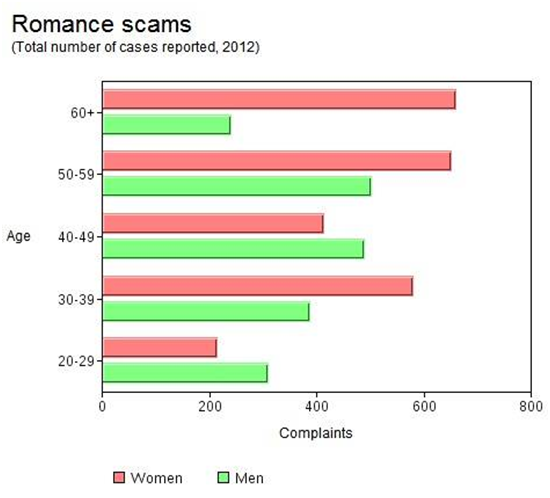
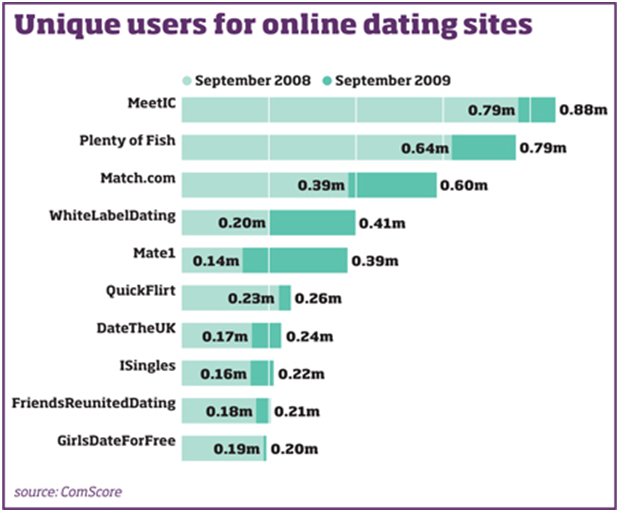
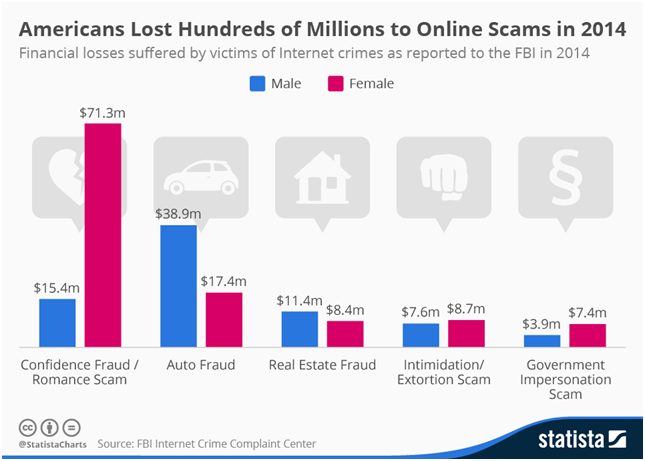
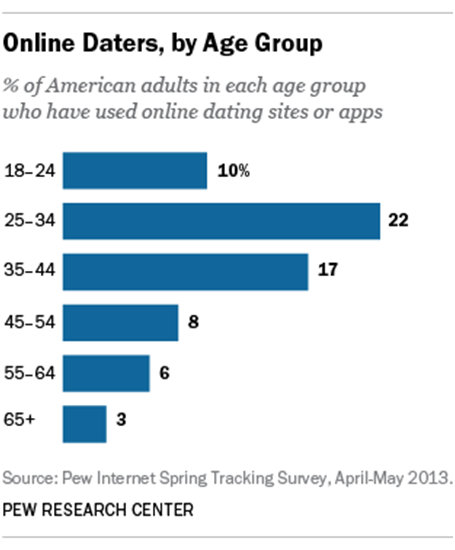


The graph presents statistics on online love/romance scams for September 2015, detailing the number of reported financial losses and the primary sources of these scams.
Cases Reported in Love Scam

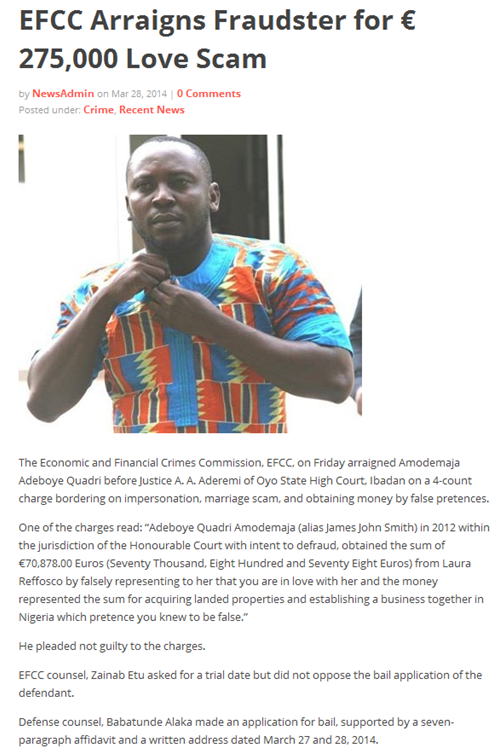

The latest news on Online dating website hacked ? 90% of profiles discovered to be fake!
The news below discusses the recent hacking of an online dating site. AshleyMadison.com is now widely recognized as an online cheating site, with thousands of fake female account profiles. Hackers revealed that no real women had created profiles on AshleyMadison.com, meaning men who believed they were dating women online were indirectly victims of a love scam. An in-depth analysis of the site's user database uncovered approximately 31 million accounts belonging to men and 5 million accounts belonging to women, with 90% of the female profiles being created internally rather than by actual users. Following the investigation and conspiracy surrounding the hacking of AshleyMadison.com, the situation has been summarized in the following statement: "AshleyMadison.com is a site where tens of millions of men write emails, chat, and spend money on women who aren't there." AshleyMadison.com stands as one of the biggest examples of online deception, serving as a critical lesson for users to remain cautious about love scams.
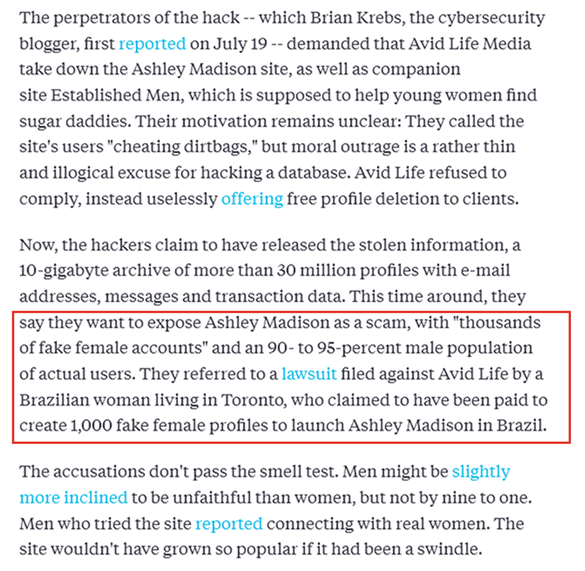

The Real News about Ashley Madison ? Revealed!


The IP addresses of over 68,000 registered female users were traced back to Ashley Madison Headquarters. This raises serious concerns about the legitimacy of female profiles on the site, suggesting they were created with the intention of conducting scams. This situation highlights a key issue—online dating websites are not always trustworthy. Behind such platforms, there could be an entire syndicate working to exploit users in the name of love.
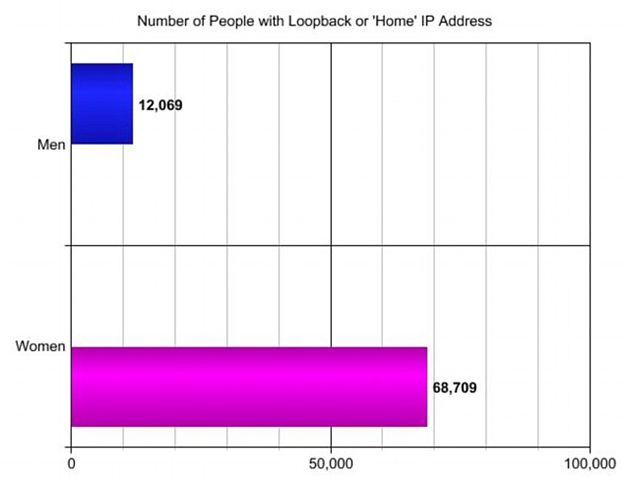
Feel Free to use our Spam Checker Tool
We are providing the Spam Checker Tool for your convenience. Here, you can enter an email or contact number that you suspect might be part of a scam. This tool cross-checks the provided details with our spam database and verifies whether the email or phone number is genuine or fraudulent.
To report a scam to the United States government, you can file a complaint regarding fraud or other crimes here.


